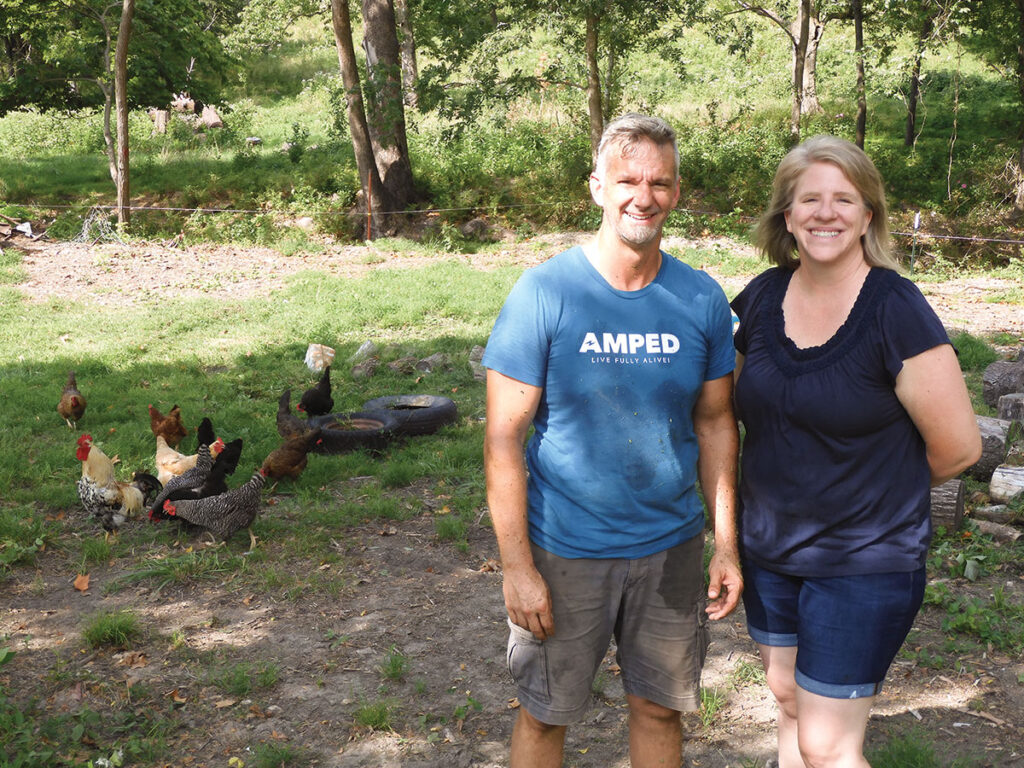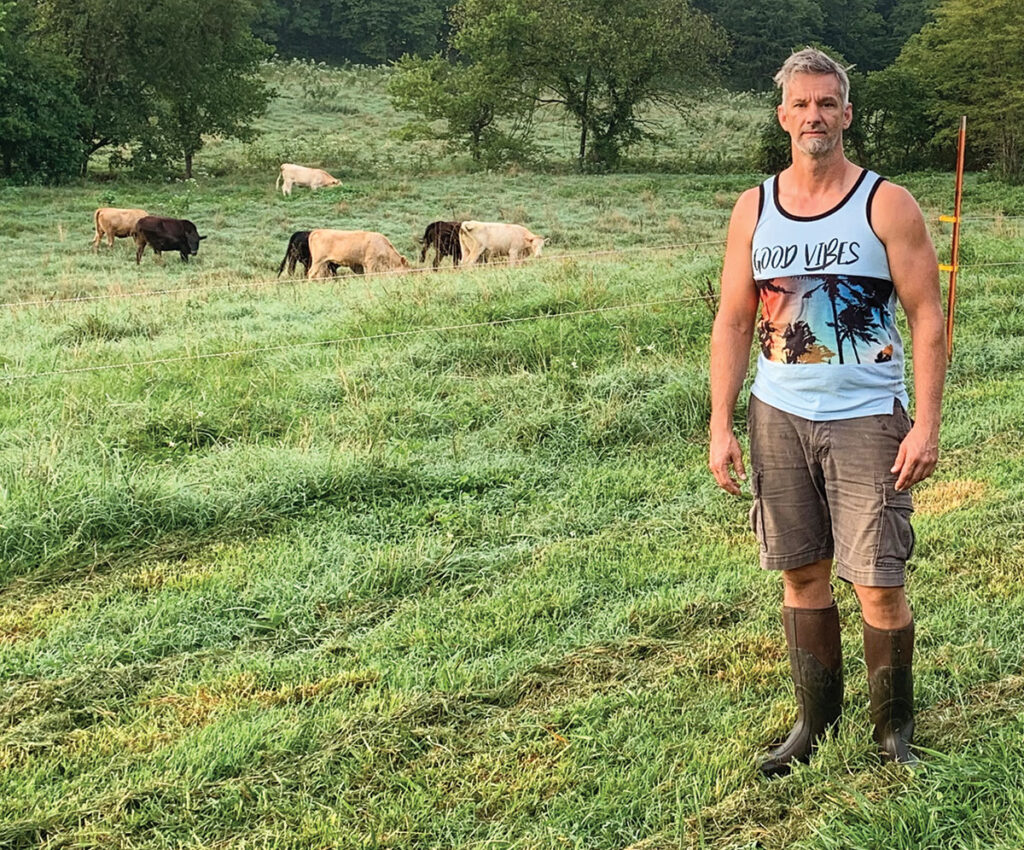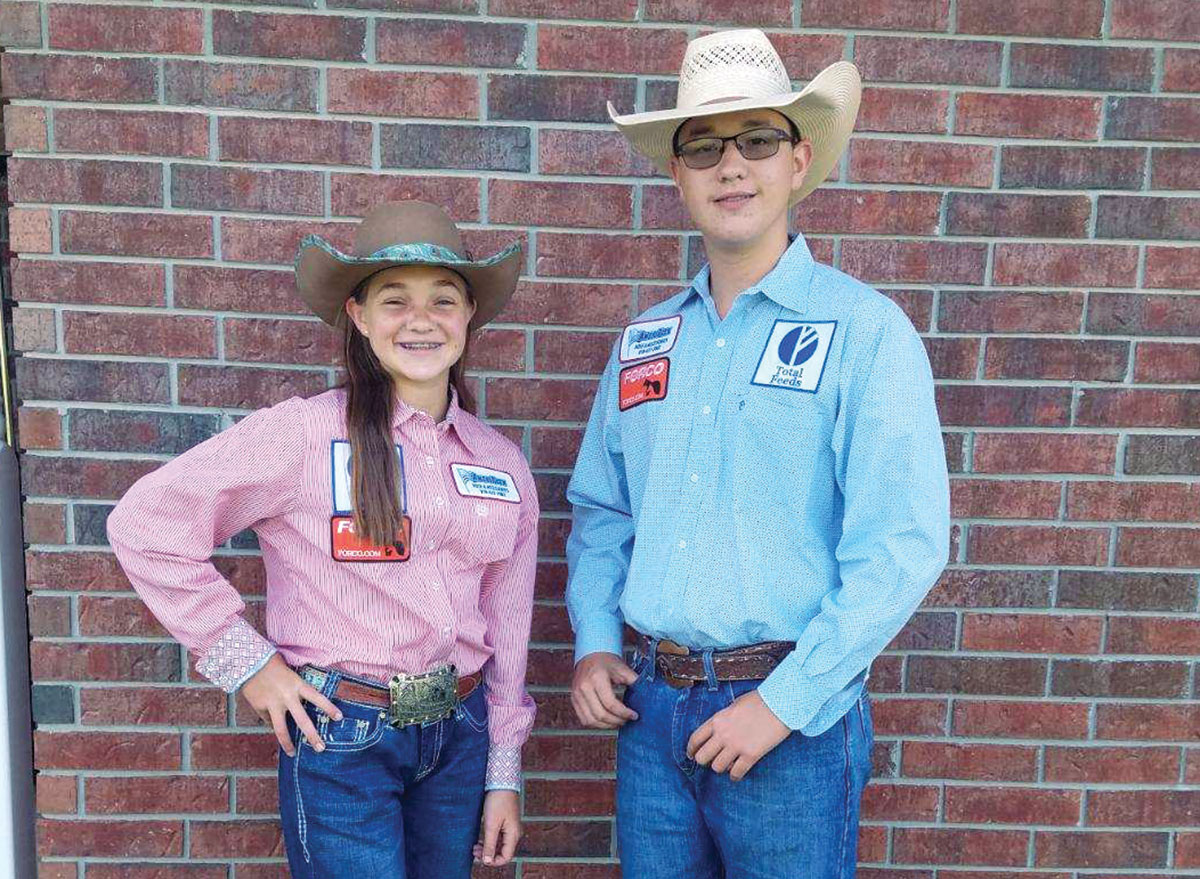
The 122-acre farm follows regenerative practices with multiple species
KANSAS, OKLA. – Kevin and Rebecca Ault were both teachers, with Kevin coming from an Arkansas subsistence farm and Rebecca from a small Iowa town named Brighton. Both believed in the importance of continual physical activity and were public school teachers though Kevin also worked at the university level.
Kevin and Rebecca have an 8-year-old daughter named Ashlin and two sons, 6-year-old Fenric and 3-year-old Powell. Not long after Powell was born, the couple decided they could serve their children more efficiently and with real-life applications by homeschooling them on a regenerative farm. The couple soon purchased a former 122-acre dairy farm that had remained fallow for almost 40 years. The now 2-year-old Team Ault Farms contains multiple species raised with environmentally-friendly practices.
Rebecca retired from teaching and started a home-based health and wellness business by partnering with a company named Xingular before they purchased the farm. In addition to being a businesswoman, Rebecca cooks, homeschools and provides an extra set of hands on the farm whenever needed.
“I remember being 5 or so when my dad Daniel purchased a Holstein steer to raise for beef,” Kevin recalled. “I promptly told my dad I was going to be a cowboy and ride that steer. After chasing and being around him all the time, that steer finally let me ride him. That which lit my desire to someday be in agriculture.”
The farm’s evolution began with the installation of good perimeter fencing. Then Kevin cleared a major portion of the land of saplings, blackberry thickets and wild rose bushes taller than Kevin. Next came brush hogging. Only then, during that first spring, did he begin the first production operation with crossbred stockers finished on grass. The finished cattle are processed before the Aults sell meat and all other farm products directly to consumers using social media and word-of-mouth.
Regenerative agriculture is designed for taking advantage of nature’s characteristic and self-healing properties to produce what many believe to be the healthiest and most environmentally-friendly foods.
“If a bug doesn’t want to eat something treated by chemicals, then I’m not sure I want to,” Kevin said out.
The couple’s lively youngsters actively help with farm, with Ashlin being particularly fond of making “salads” for a flock of heritage Ancona ducks recently purchased as day-old chicks. The breed was selected because it consumes grass and is also a dual-purpose fowl that grows to 7 pounds with each laying up to 280 eggs per year. One aspect of the farm plan is developing a farm-raised flock of Ancona from the initial group of ducklings with the goal of selling excess eggs and meat from the extra males. The other portion of the farm’s poultry production is comprised of Cornish-cross meat chickens and a variety of egg laying hens, which are favorites with the children.
According to Kevin, one of the advantages of regenerative farming is not needing extensive acreage or expensive infrastructure. Managed properly, the land supplies what is needed. What was a problem becomes part of the solution. While Kevin admits he still doesn’t thoroughly understand his grasses’ drought recovery process, he observed as he removed saplings, thickets and bushes, more light reached the land with an initial burst of weed growth which was supplanted by grass growth because grass seems to be stronger than the weeds and chokes them out.

“We stockpile our grass because we don’t overgraze it, and grass puts money in your bank account,” Kevin said. “Regenerative farming mimics natural systems and nature is both beautiful and self-healing. The 40 fallow years not only gave the land a chance to regenerate, they also allowed the springs that start on our land to cleanse themselves. God gave us an opportunity and we are trying to make best use of it.”
Rotational grazing by species is an important component with the largest species ideally grazing a section first, followed by the next largest species and so on until the smallest species finishes and is then followed by the largest.
Currently, the Aults raise cattle, pigs, chickens and ducks. They hope to add sheep and later switch to a cow/calf operation based on South Polls.
South Polls, developed in Georgia, are designed to perform on grass while also being disease resistant. They are a small, red, slick-sided breed that handles heat well.
“I like them because their high fertility is as close to being a rabbit while still being a cow and because they don’t pug up wet fields like big cows,” Kevin said. “However, using them is a future venture because we need to develop what we already have first.”
The Ault pigs are across of Duroc and Hampshire, with a bit of blue butt. They are raised with access to forest land where they “graze” on acorns, weeds, snakes and whatever else they find while using land not suitable for their other livestock. Another advantage is that the pigs disturb the soil by rooting, causing no major damage and promoting soil aeration.
When conditions demand, the Aults supplement their birds but only with fermented, non-soy grain. Cattle are supplemented with hay, but rarely. Even during the most recent drought, the Aults needed no hay because of their land management processes,.
“In today’s world, students as well as many adults want maximum reward with little effort,” Kevin surmised. “Agriculture, on the other hand, teaches hard work comes first followed by no guarantee of success, something we want our children to understand about life. My dad always said that life was a matter of priorities and that you could tell a person’s priorities by looking at their checking account and calendars.
“One of my biggest frustrations is that it’s easy for big agriculture to access government programs but difficult for those with alternative farming and living styles. I hope that discrepancy is someday minimized because starting a farm from scratch is very difficult and expensive.”







